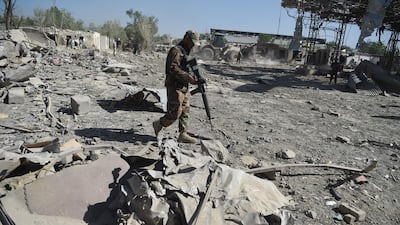Peace was and remains the top priority for Afghans. No economic and development agenda can be achieved without sustainable peace and security in Afghanistan. According to Special Inspector General for Afghanistan Reconstruction, an amount exceeding $100 billion has been invested in the country’s rehabilitation and development during the past 17 years. However, foreign aid has significantly diminished since 2014, when most of the international security forces left the country as part of transitioning to Afghan ownership. Afghanistan’s hopes for its economic growth and development lie in its vast mineral resources, investment by Afghan as well as foreign companies, and Afghanistan acting as a transit and energy corridor between the central and South Asia. Yet, these ambitious economic objectives cannot be achieved unless peace and security are restored across the country.
Leaders of the National Unity Government in Afghanistan were voted to power, based on promises of bringing peace and stability to a nation that has suffered from continuing war and conflict for the past four decades. Although the Afghan leadership tried its best, reaching out to Pakistan as well as the Taliban, these efforts did not result in any meaningful outcome. When the US President Donald Trump announced his new strategy for Afghanistan and South Asia in 2017, a peaceful settlement of the Afghan conflict was an essential element of the strategy. On the other hand, the Taliban consistently declined the Afghan government's offer for direct talks. It was in the wake of these circumstances that the US had to start direct negotiations with the Taliban through its special envoy Zalmay Khalilzad, an Afghan-American who is the best fit for the task.
The Taliban and the US delegations have held seven rounds of talks in Doha, the capital of Qatar. According to Mr Khalilzad, the talks focused on four main points, including complete withdrawal of US forces from Afghanistan, guarantees by the Taliban not to use Afghan soil against the US, an enduring ceasefire and intra-Afghan dialogue that will lay out the roadmap for a political settlement. The latest round of talks ended on July 7 with both sides expressing optimism and speaking of genuine progress. Another important development was the two-day intra-Afghan dialogue in Doha just a week ago, in which the Taliban delegation held discussions with Afghan representatives. Regardless of the fact that delegates from Afghanistan did not officially represent the Afghan government, the conference was a positive step forward in building confidence and paving the way for future direct talks between the Afghan Government and the Taliban.
Regional consensus on the Afghan peace process is of crucial importance. The ongoing armed insurgency in Afghanistan is a threat for regional stability and adversely impacts economic co-operation among countries of the region and beyond. It is encouraging that the US, Russia and China have all supported and called for immediate intra-Afghan dialogue to determine the way forward for the political settlement of the conflict. Any roadmap for peace must ensure that all parties to the conflict agree on an inclusive future set up for Afghanistan that guarantees to maintain the achievements of the past 17 years in democracy, development, women's empowerment and human rights.
Afghanistan is in a complex situation. The country will go to presidential polls in September 2019. The timing is pivotal. How the peace process and election will be synchronised is a major challenge and has been addressed neither by the Afghan Government nor other relevant stakeholders so far. Mr Khalilzad has already indicated that peace has priority over the election. Most Afghans also agree that an exercise of democracy without peace and security across the country will question the credibility of the ballot. However, the government is intent upon holding elections regardless of any parallel peace process.
In spite of ongoing peace talks, violence continues all across the country, with civilians the main victims. The Afghan National Defence and Security Forces (ANDSF) continuously attack Taliban targets and the Taliban target the former in return, either in guerrilla-style attacks or suicide bombings. This vicious cycle seems to be neverending. Mr Khalilzad has repeatedly called for a reduction in the violence, but to no avail. As a confidence-building measure, it is important that both parties in the conflict scale back their attacks, especially when civilians are potentially harmed.
US Secretary of State Mike Pompeo, during his visit to Afghanistan last month, said that his government is aiming for a peace deal in the war-ravaged country by September. If this comes true, Afghans will have a great moment to celebrate, and a chance to begin a new life after four decades of war, conflict and destruction.
Ajmal Shams is president of the Afghanistan Social Democratic Party, based in Kabul. He was a deputy minister in the Afghan National Unity Government. Ajmal Shams served as policy adviser to Dr Ashraf Ghani. He tweets at @ajmshams

